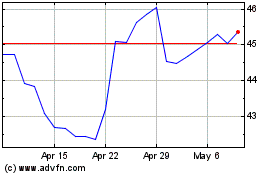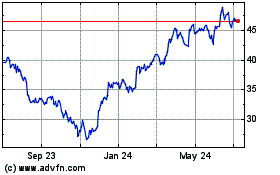By John D. Stoll and Christina Rogers
Sales for the top three auto makers selling in the U.S. slipped
in July as the strong growth rate that defined the past six years
slows to a crawl, another indication the industry is entering its
first sustained plateau since the decade leading to the financial
crisis.
Declines at General Motors Co., Ford Motor Co. and Toyota Motor
Corp. overshadow increases by smaller rivals, including Nissan
Motor Co. and Honda Motor Co. The run of sales gains in the U.S.
since 2009 has allowed most auto makers to limit reliance on
discounts and keep inventories lean, padding profits generated by
increased demand for trucks and sport-utility vehicles.
Analysts say sales incentives and fleet sales need to play a
bigger role in the market to keep the current pace afloat,
particularly after a disappointing June. Overall sales increased
modestly in July, rising 0.7% to 1.52 million, according to
research firm Autodata Corp., translating to a seasonally adjusted
annualized selling pace of 17.9 million.
While higher than the prior July, the adjusted sales pace has
leveled off compared with the sizable year-over-year increases from
2015's final six months, which drove the U.S. light-vehicle market
last year to its first record in a decade and a half.
The auto industry's recovery has been a bright spot for the U.S.
economy, with high factory utilization spurring new jobs,
investment in American facilities and wage growth for Detroit's
auto workers. Car buyers spent $49 billion on light vehicles in
July, according to TrueCar Inc., up 1% amid longer loan terms and a
boom in subsidized auto leases -- trends that keep monthly payments
on par with a decade ago even as sticker prices go up.
Overall retail sales are a trouble spot as purchases made by
individual customers in showrooms have stalled this year, down
slightly for the first seven months, according to J.D. Power. Auto
makers are betting sales to government agencies, rental-car firms
and commercial fleets will continue to grow.
At an industry conference in Northern Michigan Tuesday, GM Chief
Economist Mustafa Mohatarem said he is maintaining his view that
2016 will set another record, meaning sales will land north of 17.5
million for the year. Although overall retail demand is soft, he
says fleet sales are still tracking below historic trends and could
run higher if state or municipal budgets loosen up.
Michael Robinet, an IHS Automotive auto analyst, predicted
continued sales momentum in 2017, but his forecast comes with a
catch. He said sales gains will need to be fueled by robust sales
incentives and cheap credit. If those factors collapse, demand will
hit a rut.
July's results follow the sober view Ford executives gave last
week when reporting second-quarter earnings, a tone that led to a
13% decline in the company's stock price since the report came out
last Thursday.
Ford's U.S. sales fell 3% in July compared with the same period
a year earlier, including an unexpected 1% decline in pickup truck
sales. A 6% increase in fleet sales wasn't enough to offset a 6%
drop in retail volume.
"It's a more competitive market than we've seen in the last five
or six years when we had a lot of organic growth on the retail
level," Ford's U.S. sales chief, Mark LaNeve, said during a
conference call. "It is an indication of a plateauing market that
the major players are going to try to protect market share."
Jeff Schuster, an analyst with LMC Automotive analyst, said
"there are some warning signs out there," calling for another
slowdown in August. He urged industry executives and others
gathered at a jammed-packed Center for Automotive Research
conference in Traverse City, Mich., to look on the bright side.
"This isn't doomsday," Mr. Schuster said.
Light-vehicle sales have increased modestly over 2015's first
seven months, supporting Mr. Mohatarem's view that the U.S. market
will squeak out a record. But growth is entirely supported by sales
to fleet customers, including rental-car companies, commercial
clients and government agencies.
Sales at GM, which is far more reliant on retail sales than some
of its rivals, are down 4% through the first seven months of 2016
after a 2% decline in July. Fiat Chrysler Automobiles NV's slight
0.3% gain in July was driven by a 22% jump in fleet sales last
month.
Nissan said its July sales rose 1.2% to 132,475 vehicles, while
Honda logged a 4.4% increase to 152,799 vehicles sold in the month.
Toyota said its sales fell 1.4% to 214,233. Nissan, Honda and
Toyota are based in Japan.
Among German auto makers, BMW AG's U.S. sales fell 5% to 30,551
vehicles, while Daimler AG's Mercedes-Benz USA unit reported a 3.6%
rise to 28,523. Volkswagen AG said its U.S. sales fell 8% to
28,758, and Audi AG, the luxury-car maker owned by Volkswagen, said
its July sales in the U.S. rose 4% to 18,364.
Anne Steele
contributed to this article.
Write to John D. Stoll at john.stoll@wsj.com and Christina
Rogers at christina.rogers@wsj.com
(END) Dow Jones Newswires
August 03, 2016 02:48 ET (06:48 GMT)
Copyright (c) 2016 Dow Jones & Company, Inc.
General Motors (NYSE:GM)
Historical Stock Chart
From Mar 2024 to Apr 2024

General Motors (NYSE:GM)
Historical Stock Chart
From Apr 2023 to Apr 2024
